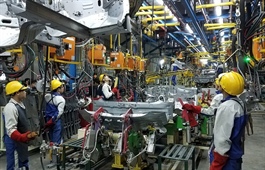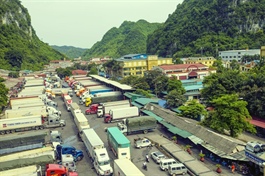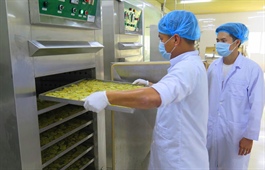Sustainable solutions necessary for agro-products
Sustainable solutions necessary for agro-products
The situation of congestion of agricultural products at border gates has brought into light requirements to diversify export markets and modernisation in the processing stage to improve product value and reach.

Over the past month, thousands of trucks carrying fruit and other goods have been stuck at the Vietnamese border with China due to strict new Chinese regulations related to pandemic prevention. A batch of government ministries and various trade sectors have been working together to clear the congestion, though this also requires cooperation from the other side of the border.
It has been reported that Pingxiang city in Guangxi province will automatically re-import the goods from January 26.
Dragon fruit has been one of the major losers in the border crisis. It is one of the most widely grown fruits in the Mekong Delta’s two provinces of Tien Giang and Long An, estimated at over 20,000 hectares. As much as 70 per cent of the dragon fruit trade in Vietnam is reliant on the Chinese market.
Congestion is not a new phenomenon, with relapses taking place before the Lunar New Year in recent years.
To avoid border gate stagnation caused by delayed imports from China, both professionals and fruit exporters believe that it is critical to diversify export markets in terms of quality and production enhancement rather than depending on a single market.
Additionally, exports of processed fruits must be increased to offset the decline in fresh fruit exports. To accomplish this goal, the connection between farmers, businessmen, and scientists must be maintained and expanded in agricultural commodities production.
Doan Van Sang, director of Cat Tuong Agricultural Products Processing Co., Ltd, in My Tho city of Tien Giang stated, “Enterprises with numerous partners in difficult markets prefer imported dragon fruit, but the product must meet the required output and set clean standards.”
Dragon fruit producers in Tien Giang and the Mekong Delta region have yet to react to the situation sufficiently. “Our enterprises are unable to satisfy the production and quality standards for dragon fruit exports,” Sang said. “We need a method for enterprises and cooperatives to collaborate, but in the short term, their developing regions must adhere to the procedure.”
Agricultural production is subject to a great many uncertainties because of its dependence on weather and diseases, especially with recent large impacts on the production and supply chain. Therefore, the development of the processing industry is considered an optimal solution to improve the value of agricultural products.
It is not only dragon fruit that can be affected by global chain breaks and congestion. Currently, there are 7,500 industrial-scale agricultural, forestry, and fishery processing enterprises in the whole country associated with exports, and tens of thousands of small-scale processing establishments and households on top of that. It is estimated that each year the sector has the ability to process and preserve about 120 million tonnes of related raw materials.
In recent years, the number of businesses investing in agricultural processing has increased but the rate is still very low, with outdated technology and low professional capacity abundant.
Nguyen Lam Vien, chairman and general director of Vinamit JSC, said that Vietnam has the advantage of a huge source of agricultural, forestry, and fishery raw materials, but often does not know how to add value to such products.
“Specifically, if a kilo of sweet potatoes is sold fresh for only around VND20,000 (87 US cents), if processed, the value can increase dozens of times,” Vien said.
Post-harvest losses are still large, ranging from 10-25 per cent, and preservation methods are simple and outdated. Preliminarily-processed products with low added value account for 70-80 per cent, while deeply processed products with high added value only account for 15-30 per cent.
Minister of Agriculture and Rural Development Le Minh Hoan said, “Currently, 20-30 per cent of domestic agricultural products go through processing for export. Meanwhile, in Taiwan, nearly 80 per cent of processed agricultural products are sold to the market. We need to step up the processing, which creates very high added value and benefits for the producers.”
Tran Thi Thu Trang, chairman of the board at Hanel Production and Import-Export JSC (HanelPT), said finding cutting-edge agricultural product processing technology is a way to solve the problem of agricultural product stagnation in the harvest season, creating sustainable output for farmers.
Hanel PT has launched SASAKI freeze-drying technology according to Japanese standards, which shortens the drying time to about 6-8 hours per batch.
“Normal drying technology often causes heat shock as well as a loss of vitamins, minerals, and fibre in agricultural products. Our freeze-drying process draws moisture out of the products while preserving the flavour,” Trang said.


























